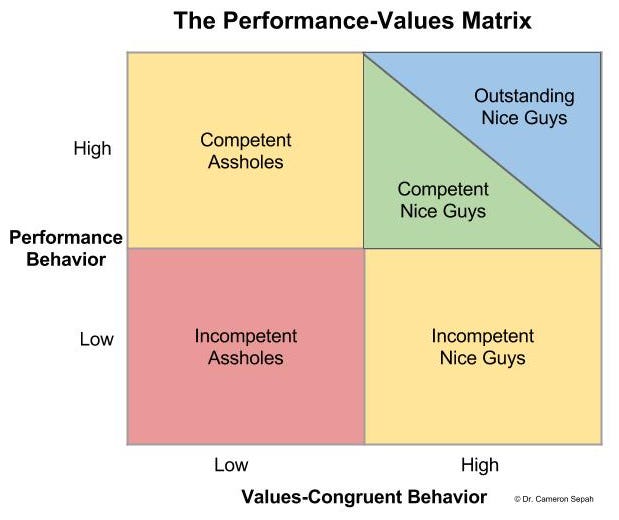- Adam Grant On Interviewing to Hire Trailblazers, Nonconformists and Originals | First Round Review
“By default, companies are built in the image of their founders, which is why it’s vital to proactively introduce diversity of thought… ‘What happens when startups get successful and grow is that they become more and more vulnerable to the attraction-selection-attrition cycle, where people of the same stripes are increasingly drawn to the organization, chosen by it and retained at it. The way to combat that homogeneity creep is to proactively infuse the culture with originals, who have the will and skill to think differently'”. - How to Hire | eShares
Four principles and six heuristics on hiring. Some of them are counter-intuitive, and all of them turn what we think we know about hiring on its head. - Your Company’s Culture is Who You Hire, Fire, & Promote | @DrSepah
The writer presents a powerful Performance Value Matrix based on the following with the following categories and rules: Incompetent Assholes (Fire Fast); Competent Assholes (Remediate or Separate); Incompetent Nice Guys (Manage or Move); Competent and Outstanding Nice Guys (Praise and Raise). - The No Asshole Rule: Part 1 | HuffPost
There are myriad costs to keeping employees who engage in demeaning behaviour in an organisation: From how detrimental they are to the mental and physical health of their colleagues, to the overall undermining of learning and organisational effectiveness. - Why I Wrote The No Asshole Rule | Harvard Business Review
“My father always told me to avoid assholes at all costs, no matter how rich or powerful they might be, because I would catch their nastiness and impose it on others. I learned, as an organizational psychologist, that his advice is supported by research on ’emotional contagion’: if you work for a jerk, odds are you will become one”.
Tag - business
- 4 Ways to Improve Your Strategic Thinking Skills | Harvard Business Review
Think strategically by looking beyond and looking within. Take time to observe what’s going on around and you, and make time to reflect on this and synthesise your knowledge. - Great Leadership Isn’t About You | Harvard Business Review
“…leading people well isn’t about driving them, directing them, or coercing them; it is about compelling them to join you in pushing into new territory. It is motivating them to share your enthusiasm for pursuing a shared ideal, objective, cause, or mission. In essence, it is to always conduct yourself in ways that communicates to others that you believe people are always more important than things”. - What Great Managers Do Daily | Harvard Business Review
Great managers are engaged at work – in what they do and with others around them – and take the time to engage their teams, through one-on-ones and fair distribution of workloads. - Seven Surprises for New CEOs | Harvard Business Review
These “seven surprises highlight realities about the nature of leadership that are important not just for CEOs but for executives at any level and in any size organization”. An illuminating read. - Why the Best Leaders Want Their Superstar Employees to Leave | The Wall Street Journal
It may seem counter-intuitive, but there are benefits when talent flow is managed well, with allowances made for movement, instead of an insistence on talent-hoarding.

So you know how I like to predict how and why technology should change to cleave to our modern ways of living, right?
Hence, for my next trick, I’m going to ask: Technological powers-that-be, when are we going to turn our office numbers into work numbers for the mobile?
And mind you, I’m not talking about call forwarding.
I’m referring to an actual office line that can be combined with our present personal mobile phone line – but which we can choose to switch off when we’re out of the office.
Think about it. To create a clear divide between the professional and the personal, we have:
- Personal e-mail addresses and office e-mail addresses; and
- Personal phone lines and office phone lines.
Before the advent of mobile data technology, office tools were often fixed, and we had to enter the office to use those specific tools.
Now, we can do almost everything on the go; we can make personal calls on our mobile phones, and check our personal and office e-mail on the same device.
So at which point did companies say: “Hey! We’re gonna stop developing technology for office phone lines because there is no need to.”?
Because of this – lapse? change of focus? – we now have work-based communication taking place on our personal lines.
Some examples: Whatsapp office group chat messages, or text messages and voice calls from clients.
It’d be nice to have the option of setting “away from office” auto-replies on our work phone lines when on leave or after leaving the office, so we can draw a distinction between work and leisure.
Therefore, I’m calling this right here, right now, Lare-style: There’s a portion of the technology that’s lagging behind everything else when it comes to the modern office telephone line.
Technological powers-that-be, please do something about it. You’ll more than reap the rewards when everyone starts adopting this service.
